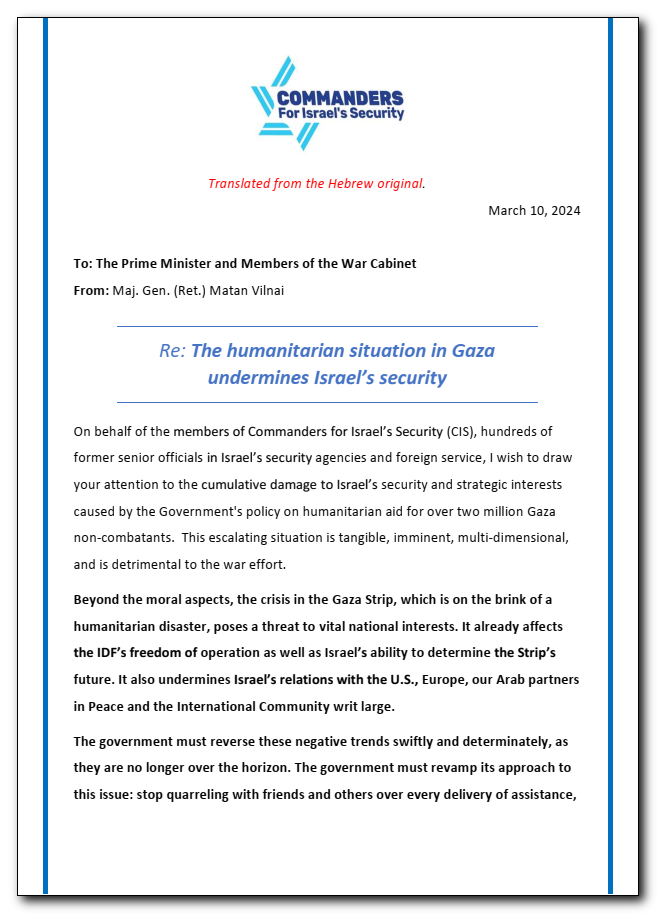Translated from the Hebrew original.
March 10, 2024
To: The Prime Minister and Members of the War Cabinet
From: Maj. Gen. (Ret.) Matan Vilnai
Re: The humanitarian situation in Gaza undermines Israel’s security
On behalf of the members of Commanders for Israel’s Security (CIS), hundreds of former senior officials in Israel’s security agencies and foreign service, I wish to draw your attention to the cumulative damage to Israel’s security and strategic interests caused by the Government’s policy on humanitarian aid for over two million Gaza non-combatants. This escalating situation is tangible, imminent, multi-dimensional, and is detrimental to the war effort.
Beyond the moral aspects, the crisis in the Gaza Strip, which is on the brink of a humanitarian disaster, poses a threat to vital national interests. It already affects the IDF’s freedom of operation as well as Israel’s ability to determine the Strip’s future. It also undermines Israel’s relations with the U.S., Europe, our Arab partners in Peace and the International Community writ large.
The government must reverse these negative trends swiftly and determinately, as they are no longer over the horizon. The government must revamp its approach to this issue: stop quarreling with friends and others over every delivery of assistance, significantly expand aid quantity, its transportation, and the number of dedicated crossings, while ensuring safe distribution to the two million non-combatants.
As indicated, the adverse effect of today’s policy is multi-dimensional:
The U.S.
In CIS member’s contacts with senior U.S. administration officials (undertaken in non-CIS frameworks), they have encountered broad agreement on two war aims – eliminating Hamas’ capabilities and releasing the hostages, but at the same time witness growing frustration and anger over Israel’s lack of a “day after” strategy and, in the immediate term, what has been dubbed a “humanitarian stinginess.” These sentiments were expressed prior to War Cabinet Member Lt. Gen. (Ret.) Benny Gantz’s recent visit to Washington, which reportedly focused on these issues, but no less firmly in its wake.
The U.S. administration’s decision to airdrop humanitarian assistance (an unprecedented measure taken in territory controlled by a friendly state) and President Biden’s decision to establish a maritime supply venue, reflect the place of humanitarian aid in American values, strategic considerations and domestic constraints. They also demonstrate frustration over our government’s policies and a resolve to deny Israel “veto power” on this matter, and by implication, on other matters pertaining to the war in Gaza and the future of the Strip.
All of this is also expressed in National Security Memorandum (NSM) 20, signed by the President on February 8, which requires the State Department and Pentagon to obtain written assurances from recipients of American security aid that they adhere to the rules of international law, including the provision of humanitarian aid. The administration is already seeking such reassurances from Israel and members of Congress are advancing measures to ascertain compliance and stipulate consequences of violations.
The intensity of public protest in the U.S., much like the effect of the Gaza situation in eroding support for Israel (especially among the young), should alarm anyone who appreciates the importance of the American factor in our present and future national security paradigm.
States in the region
In contacts with our peace partners – Egypt, Jordan and the Abraham Accords signatories – we have found that the initial support for a strong response to the murderous atrocities committed by Hamas on October 7, have given way to expressions of concern about the repercussions of the humanitarian crisis.
Just as some of these states provide aid to the Gaza civilian population, representatives of more than one of them report a decision to suspend normalization steps. This includes confining contact with Israel to directly addressing the situation in Gaza and regional stability, as well as to the need to prevent provocations by extremists on both sides during the month of Ramadan.
Europe
Whether inspired by the statements and actions of the U.S. administration or based on independent considerations, the opposition to Israel’s “humanitarian stinginess” throughout Europe and beyond has already led a number of governments to suspend the supply of armaments to Israel.
The bottom line:
The damage caused by the policy of humanitarian stinginess, like that of outrageous statements of irresponsible ministers and MKs, undermines the foundations of security and diplomatic support for Israel emanating from capitals that are most important for our security.
We urge you all to restrain the extremist firebrands, prioritize Israel’s security and strategic interests over coalition considerations, and urgently lead extensive humanitarian aid efforts, before the IDF freedom to operate in the Strip, Israel’s freedom to shape the Strip’s future, and our relations with the U.S., Arab peace partners, Europe and the international community suffer irreparable damage.
Respectfully,
Maj. Gen. (Ret.) Matan Vilnai
Chair
For the original letter (in Hebrew) – click here
For the translated letter (in English) – click here


